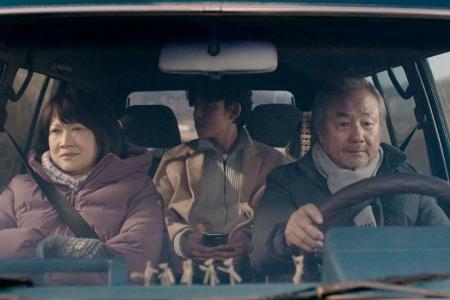Movie review: Ajoomma (NC16)
The story: Auntie (Hong Huifang) is a Singaporean widow obsessed with K-dramas, and her son Sam (Shane Pow) is growing to have his own life outside the home. She signs up for a guided tour of locations of her favourite K-dramas. In Seoul, she finds herself lost and alone, and becomes involved in the lives of a security guard Jung Su (Jung Dong-hwan) and tour guide Kwon-woo (Kang Hyung-seok).
When the words “Singaporean film”, “auntie character” and “comedy” come together, people have been conditioned to think of Royston Tan films, such as 881 (2007) and 12 Lotus (2008).
They feature sassy middle-aged women who are not afraid of speaking up or taking up space. Tan’s aunties could be your best friend or worst enemy and the life of the party.
In contrast, the auntie in Singapore film-maker He Shuming’s sensitive debut feature would rather not call attention to herself. Like so many older women, she hates making a fuss, and it is that tendency to shrink into the background that triggers her unplanned journey across South Korea.
Instead of opportunities for fish-out-of-water jokes or bits about mistranslated phrases leading to hilarious misunderstandings, He’s film explores what it means to develop deep connections with someone despite the lack of a common language.
Imagine Lost In Translation (2003), except with a main character who actually does not patronise or infantilise his hosts, but who instead likes and respects them.
As they say, money is a country of its own.
The rich in Russia, Singapore and Saudi Arabia have more in common with one another than they do with the poor in their own nations.
He’s position is that growing older, especially when one has to grow older alone, can be a basis for bonding. Hong’s Auntie and Jung’s Jung Su are unable to converse, but with gestures and facial expressions, they find they have a shared experience that transcends language.
In contrast to the largely internal and unspoken relationship developing between the older characters, there is a plot thread involving troubled Mandarin-speaking Kwon-woo (Kang). His story serves as a meta comment about K-dramas happening in real life, even as it teaches Auntie life lessons that she applies to her relationship with son.
Ajoomma relies on indirectness, poetry and gentle jokes that emphasise similarities across cultures rather than differences. It mostly works, but intrusive plot elements involving underdeveloped supporting characters undermine that intention. Auntie preferred to stay in the background. These characters should have followed her example.
Hot take: Despite tonal inconsistencies, this is an enjoyable story of a woman who travels to the land of K-drama only to find herself involved in a real-life drama.
Verdict: 3 stars
Get The New Paper on your phone with the free TNP app. Download from the Apple App Store or Google Play Store now


